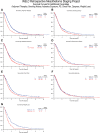Supplementary prognostic variables for pleural mesothelioma: a report from the IASLC staging committee
- PMID: 24807157
- PMCID: PMC4132031
- DOI: 10.1097/JTO.0000000000000181
Supplementary prognostic variables for pleural mesothelioma: a report from the IASLC staging committee
Abstract
Introduction: The staging system for malignant pleural mesothelioma is controversial. To revise this system, the International Association for the Study of Lung Cancer Staging Committee developed an international database. This report analyzes prognostic variables in a surgical population, which are supplementary to previously published CORE variables (stage, histology, sex, age, and type of procedure).
Methods: Supplementary prognostic variables were studied in three scenarios: (1) all data available, that is, patient pathologically staged and other CORE variables available (2) only clinical staging available along with CORE variables, and (3) only age, sex, histology, and laboratory parameters are known. Survival was analyzed by Kaplan-Meier, prognostic factors by log rank and stepwise Cox regression modeling after elimination of nonsignificant variables. p value less than 0.05 was significant.
Results: A total of 2141 patients with best tumor, node, metastasis (TNM) stages (pathologic with/without clinical staging) had nonmissing age, sex, histology, and type of surgical procedure. Three prognostic models were defined. Scenario A (all parameters): best pathologic stage, histology, sex, age, type of surgery, adjuvant treatment, white blood cell count (WBC) (≥15.5 or not), and platelets (≥400 k or not) (n = 550). Scenario B (no surgical staging): clinical stage, histology, sex, age, type of surgery, adjuvant treatment, WBC, hemoglobin (<14.6 or not), and platelets (n = 627). Scenario C (limited data): histology, sex, age, WBC, hemoglobin, and platelets (n = 906).
Conclusion: Refinement of these models could define not only the appropriate patient preoperatively for best outcomes after cytoreductive surgery but also stratify surgically treated patients after clinical and pathologic staging who do or do not receive adjuvant therapy.
Conflict of interest statement
Disclosure: The authors declare no conflict of interest.
Figures


References
-
- Rusch V, Baldini EH, Bueno R, et al. The role of surgical cytoreduction in the treatment of malignant pleural mesothelioma: meeting summary of the International Mesothelioma Interest Group Congress, September 11–14, 2012, Boston, Mass. J Thorac Cardiovasc Surg. 2013;145:909–10. - PubMed
-
- Fennell DA, Parmar A, Shamash J, et al. Statistical validation of the EORTC prognostic model for malignant pleural mesothelioma based on three consecutive phase II trials. J Clin Oncol. 2005;23:184–9. - PubMed
-
- Rusch VW, Giroux D, Kennedy C, et al. IASLC Staging Committee. Initial analysis of the International Association for the Study of Lung Cancer mesothelioma database. J Thorac Oncol. 2012;7:1631–1639. - PubMed
-
- Francart J, Vaes E, Henrard S, et al. A prognostic index for progression-free survival in malignant mesothelioma with application to the design of phase II trials: a combined analysis of 10 EORTC trials. Eur J Cancer. 2009;45:2304–2311. - PubMed
Publication types
MeSH terms
Substances
LinkOut - more resources
Full Text Sources
Other Literature Sources
Medical

